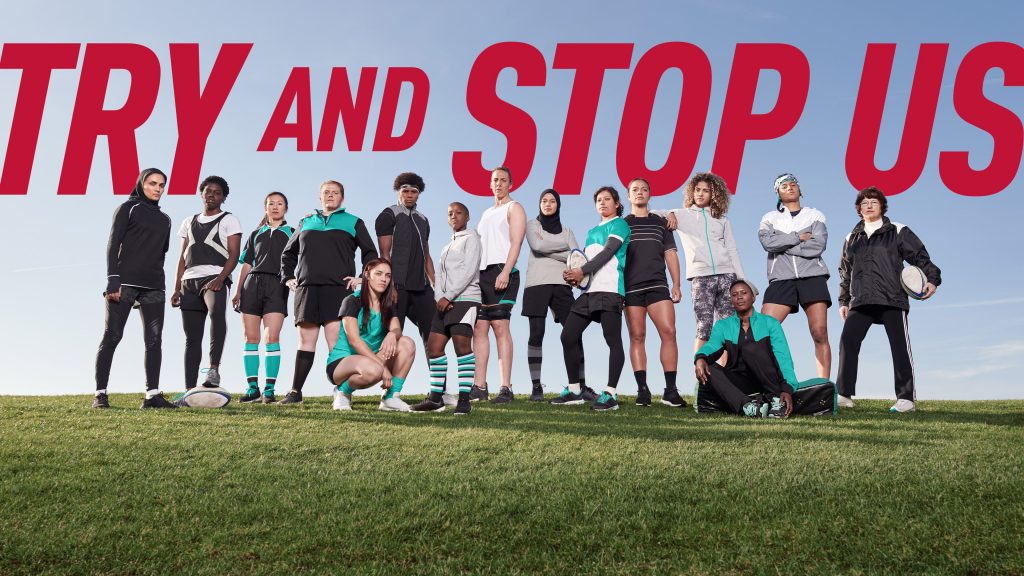Coaching Women's Rugby

For many years, the game of rugby union has been dominated by male coaches, administrators and players.
That picture is changing fast!
The women’s rugby is one of the fastest growing sports in the world, fueled by local and global initiatives such as World Rugby’s ‘Try and Stop Us’ campaign which is fostering even greater interest and attracting even more players to the women’s game.
That said, getting quality female referees and coaching for girls and women’s teams remains difficult, due to male rugby most often taking priority in clubs, schools and unions over the female game.
How many women play rugby?

The IRB reports that in 2018 women’s rugby had 2.7 million registered participants, a 28 per cent increase compared to 2017 – making women more than a quarter of the global rugby playing population.
In many traditional rugby playing countries, such as New Zealand, women’s rugby is reported as growing faster than the men’s game. Case in point, a review by Deloitte’s in 2018 of the 15 a side noted the number of registered female rugby players grew by 2,100 registrations, a 13.7 per cent growth over the previous year, when the men’s game showed a continuing decline. New Zealand rugby also reported women’s rugby grew by 40% between 2016 and 2019, from
22,000 players to over 31,000 players.
Most importantly, female rugby is expanding to many countries and continents around the world. Even non-traditional rugby playing countries, such as the USA, are reporting rapid growth, with the USA noting an estimated 25,000 teenage females playing some version of rugby in 2014.
International women’s rugby events, such as the 2021 Women’s Rugby World Cup, are key to growing the female game.
Asia rugby also reports a 33 per cent increase in participation on the continent since 2017 – see the stats in the infographic below.
Women's Rugby Stats in an Infographic

Tips for continuing to grow female rugby
The following are three core areas rugby unions should focus on to grow participation by girls and women.
- Give women key roles in the governance structure of rugby in your union. Don’t just ‘tick the box’. Ensure women are well represented, top down, in your union, clubs and schools. Ensure they play a key part in the evolution of rugby in your county, unions and communities.
- Provide female rugby players, coaches and administrators with equal access to facilities and resources. For example, ensure your club changing rooms are gender equal and you have fair access to equipment and grounds.
- Provide good quality coaching. Sports coaches have a huge impact on the individuals they coach. A one-size-fits-all approach will not work in girl’s and women’s rugby. The technical aspects and laws of rugby are the same for females and males. However, we recommend aspiring female rugby coaches should read the following section on “coaching advice for female rugby coaches” to understand how to give female rugby players a positive rugby experience.
Coaching advice for female rugby coaches
- Coaching any rugby team, be it a junior Rippa rugby team, a group of teenage girls or a premiership team, is a challenge for any coach, especially if you are a female with no or little experience coaching or playing the game.
Here are a few tips to help guide your coaching efforts:
- Be you. Don’t try and coach like you’ve seen others coach. Observe and learn from others, but always be true to yourself, or the players will not trust you. And trust with female rugby players is very important.
- Bear in mind most of the better rugby coaches do well at the “how” rather than the “what’. Spend your time coming up with exciting, engaging ways to coach your team than being too obsessed with the technicalities of, say, how to pass the ball. You’ll learn the most important technical aspects over time.
- If you’re coaching a female team, don’t coach them as if they are males. For example, females generally have a stronger sense of togetherness, are more curious than men and listen well.
- Female players often expect lots of information and detail, which can be intimidating if you are a less experienced coach. There are two main reasons for this:
- Females most often haven’t built the tacit understanding of the game males do by playing backyard footy from a young age.
- Girls will want to discuss things as a group as part of an open discussion.
Let the dialogue flow, whilst still maintaining an element of control, as you don’t want the whole training to end up being a discussion. Just be willing to listen patiently, respond where you can but most importantly, encourage them to come up with the answers themselves.
- Start with the junior grades then work your way up as you build experience. There is a shortage of coaches, in particular women coaches. This means you may be asked to coach beyond your means, which can be demoralizing and make you question your abilities. All coaches start somewhere then work there way up the coaching ladder, often being demoted before they progress again. So be patient, learn, observe and build up your experience over time.
- Go on coaching courses. Start with the easier courses then progress from there. Be sure not to rush – most of the top coaches in the world are in their 60’s.
- Watch a lot of rugby. All coaches do this. Learn to analyse games using coaching frameworks. This is where your inexperience may actually help, potentially enabling you to see obvious things you’d change that more experience coaches assume are the status quo.
- Surround yourself with a few experienced mentors. Learn from them, ask them to come watch your games and your practices.
- Know yourself, your coaching style, your personality, strengths and weaknesses. Then try and coach with others that compliment your style.
- Write down your reason for coaching. Be sure it’s not about you or your ego. Find a ‘why’, something that motivates you to continue during the tough times.
- Don’t be intimidated by what is still a male oriented sport. Keep it simple, be honest when you are not sure about something and always be you.
- Generally, female rugby players will be less physical and aggressive then males. This means your coaching will probably be more about playing into space than expecting your players to play a more physical and direct style of play.
- One of the toughest adjustments to make, in particular of you are used to coaching male rugby players, is changing male rugby terminology to female. For example, number is called ‘eighth man’, maybe just call the position “number 8”.
- Modern rugby coaches use videos and photographs to encourage players to reflect on coaching aspects. Bear in mind, female players may get more embarrassed than males when watching themselves on a video, photo or even when playing in front of a crowd.
- Females tend to be natural “unselfish” team players. From a technical point of view, this means your players will be more likely to pass the ball than say male rugby players, especially if they come from sports such as netball where the ball gets passed a lot. Playing an unselfish brand of rugby is a huge positive, something coaches of boys rugby teams dream of happening! That said, it’s important to coach female rugby team that there are times in a game of rugby when it’s better to tuck the ball under the arm and have a go.
